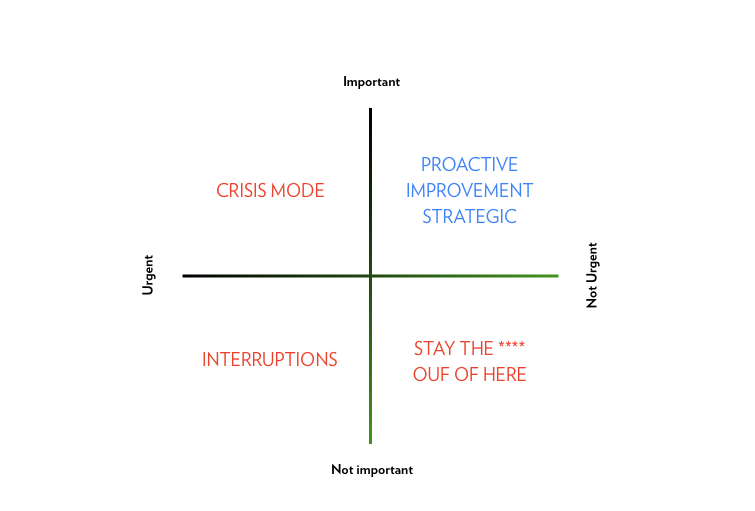Why do some people, some teams, some companies create outstanding work, while others seem stuck in mediocrity? Why do some of us excel in creativity, have better ideas, and find ways to make ideas happen while others don’t?
That question has been on my mind for quite some time now.
The more I thought about this, the more I came to believe that it is less about the capabilities of the individual or the team, but more about the ability to focus.
Focus and attention have become a rare currency in today’s distracted society. Yet at the core, attention defines our successes, our failures, our happiness, and perhaps more importantly: who we are.
How do you spend your time?
If you get up and you start your day answering emails or working on things that are important to others but not to yourself, chances are you’ve already started your day in mediocrity. You’ve just limited your capacity to create something great.
It’s easy to commit to too many projects, write a bunch of emails, and help others whenever they ask for your advice. It keeps you busy, feels like you’re needed, and you get a sense of getting stuff done. But how much of that working time is spent *creating* things you actually care about?
1. Identify your quadrants on how you spend time
Stephen Covey famous quadrants of busyness illustrate the problem.

Most of us think we’re working on urgent and important stuff. The irony is that urgent often doesn’t equate to important at all. Urgent needs to be done, but important is where you can have impact. Not surprisingly…
What’s important to someone else often ends up feeling urgent to you.
I’d argue that urgency is the number one reason passionate people get stuck in mediocrity. But it depends on the type of urgency. A limited amount of urgency can be a great source of inspiration. It can help us prioritize, be focused, and get stuff done. But once urgency becomes a default state in how you, your team, or your company operates, it inadvertently becomes a catalyst for mediocre work.
Too much mediocre work, too many sacrifices, and a continuous lack of pride doesn’t just kill passion and create a culture of mediocrity. It makes people quit.
So…
What are you excited about?
What are you excited about? Chances are it’s not what you spend your lion’s share of time working on. We all have responsibilities and even if you’re at a startup — living the dream — and super excited about shipping your world changing idea, you probably still need to write that damn investors report from time to time.
That’s probably ok. A 100% focus on one single task is not just an illusion, but it can actually severely limit your ability to stay flexible and improve your ideas along the way.
But there is a large body of research that shows that people who find ways to do what they love, excel in how they contribute, grow, and ultimately succeed.
We’ve heard that story a couple of times didn’t we?
But while the do-what-you-love mantra has gotten so much attention lately, the necessary sacrifice to get there didn’t.
2. Regaining focus
Staying focused is not easy. I’m terrible at it, not just because I have severe ADHD, but because I easily get excited about new ideas.
The struggle of passion, is a struggle of focus.
At the core of our focus lies our ability to say no. Breaking a constant sense of urgency only happens, once we learn how to say no and start reconnecting with the values we deeply care about. This is—I believe—our ticket out of mediocrity.

Saying no is like standing in parking lot and trying to spot your car. What color is it? Red? Great. Your brain will automatically adjust your perception and make red cars pop while the blue, gray and black ones slowly fade in the background. This is called selective attention. It’s magical, it works, and we should learn how to put it to work outside of the parking lot.
After all, this is not about you finding your car, but about you deciding how you spend your time. Without the willingness to allow other priorities to fade in the back, focus won’t happen and we risk getting sucked right back into the vicious circle of mediocrity.
3. Keep saying no
You’ve made it till here. You kept saying no, you were able to resist distractions, and start seeing your first results. Congratulations. Let’s tap ourselves on the back and celebrate that moment for a second.
That was great. Now what?
The problem with successes, no matter how big or small, is that they will make it even harder for you to stay focused. I know people who get invited to conferences and give one talk after another while at the same time neglecting the very thing that got them on stage in the first place.
Focus needs deliberate practice and attention. We need to nurture it. We need to focus on staying focused.
Let’s keep doing that and hopefully it will keep us out of the dreaded cycle.
Conclusion
Even though we may think that mediocre work is avoidable, in reality, it’s not. Our capacity to create great things also relies on our willingness to be mediocre along the way.
The important part is giving ourselves the tools to ensure growth. And I think the steps to get there are remarkably simple.
It starts by stopping to operate in a constant sense of urgency, remembering why you signed up for what you do, and keeping your focus on things where you personally feel like you can make the most significant contribution.
Do you have some tips for all of us out there who have a hard time to focus? Please share.
We can keep in touch on Medium or on Twitter.
Special thanks to Matt Stokes for his thoughts on the importance of slowing down.
Note: Thanks to Adrian for contributing to our blog with this article.